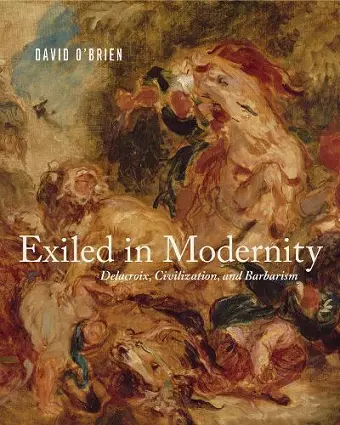Exiled in Modernity
Delacroix, Civilization, and Barbarism
Format:Hardback
Publisher:Pennsylvania State University Press
Published:6th Feb '18
Currently unavailable, and unfortunately no date known when it will be back

Notions of civilization and barbarism were intrinsic to Eugène Delacroix’s artistic practice: he wrote regularly about these concepts in his journal, and the tensions between the two were the subject of numerous paintings, including his most ambitious mural project, the ceiling of the Library of the Chamber of Deputies in the Palais Bourbon. Exiled in Modernity delves deeply into these themes, revealing why Delacroix’s disillusionment with modernity increasingly led him to seek spiritual release or epiphany in the sensual qualities of painting.
While civilization implied a degree of control and the constraint of natural impulses for Delacroix, barbarism evoked something uncontrolled and impulsive. Seeing himself as part of a grand tradition extending back to ancient Greece, Delacroix was profoundly aware of the wealth and power that set nineteenth-century Europe apart from the rest of the world. Yet he was fascinated by civilization’s chaotic underbelly. In analyzing Delacroix’s art and prose, David O’Brien illuminates the artist’s effort to reconcile the erudite, tradition-bound aspects of painting with a desire to reach viewers in a more direct, unrestrained manner. Focusing chiefly on Delacroix’s musings about civilization in his famous journal, his major mural projects on the theme of civilization, and the place of civilization in his paintings of North Africa and of animals, O’Brien links Delacroix’s increasingly pessimistic view of modernity to his desire to use his art to provide access to a more fulfilling experience.
With more than one hundred illustrations, this original, astute analysis of Delacroix and his work explains why he became an inspiration for modernist painters over the half-century following his death. Art historians and scholars of modernism especially will find great value in O’Brien’s work.
“Combining careful readings of Delacroix's paintings and prose, David O'Brien offers fascinating insights into the artist's perception of the modern world and its disenchantment. The figure that emerges is complex, conflicted, and driven by a deep ambivalence toward civilization. O’Brien successfully renews our vision of Delacroix by elaborating a subtle dialogue between formal analysis and intellectual biography.”
—Neil McWilliam, author of Dreams of Happiness: Social Art and the French Left, 1830–1850
“David O'Brien makes an original and compelling argument about Delacroix’s treatment of civilization and barbarism. He shows masterfully how this prominent theme reflects the painter's grappling with modernity, with consequences for his conception and practice of painting. The result is a new perspective on some of Delacroix’s most interesting works, including a brilliant chapter on his paintings of wild animals and another on his North African subjects. This is a crucial addition to the literature on Delacroix and on nineteenth-century art more generally.”
—Michèle Hannoosh, author of Baudelaire and Caricature: From the Comic to an Art of Modernity
“A thoughtful, wide-ranging, and utterly relevant exploration of Delacroix’s own version of the clash of civilizations, rooted in the artist’s reading of history and in his attitudes and convictions regarding human nature. In a suite of elegant and illuminating demonstrations, David O’Brien shows how Delacroix’s thinking, as it developed, powerfully shaped key pictures by the artist—just as they in turn shaped the attitudes of Delacroix’s audiences.”
—Marc Gotlieb, author of The Plight of Emulation: Ernest Meissonier and French Salon Painting
“A beautiful, well-researched volume on 19th-century French painter Eugene Delacroix’s general philosophy and specific paintings.”
—R. J. Goldstein Choice
“O’Brien has provided a model for art historians after the cultural turn in the humanities, reinserting a sensitive assessment and analysis of style into the making of meaning.”
—John P. Lambertson Nineteenth-Century Art Worldwide
“O’Brien’s book puts forward a strong and convincing argument eloquently supported by his insightful reading of Delacroix’s writing, aptly and enticingly paired with his paintings. The painter’s invocation of primitive realms in counterpoint to his dark view of modernity resonates throughout nineteenth-century culture and art, as it still does to this day.”
—Nina Athanassoglou-Kallmyer CAA.Reviews
“As a threshold figure and an artist of paradoxes, Delacroix will probably always remain somewhat elusive. But under O’Brien’s masterly care, the artist is rendered more scrutable. . . . This thoughtful examination of Eugène Delacroix’s meditations in prose and paint will be of use to scholars in many fields, but especially to those eager to put aside conventional ways of framing the mid-nineteenth-century French art world and to embrace its complexities.”
—Heather Belnap H-France
ISBN: 9780271078595
Dimensions: 254mm x 203mm x 23mm
Weight: 1179g
240 pages